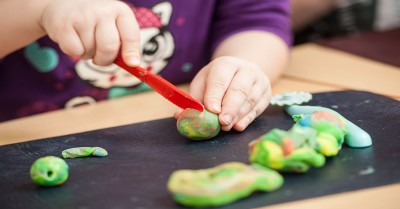Sensory experiences enable children to use their senses to explore and manipulate objects.
Through touch, smell, hear, seeing and tasting it contributes to a child’s overall learning. When exploring through sensory play children will also begin to classify objects based on different textures, which is an important part of learning.
Listed below are some suggested learning objectives that support a child's overall development.
- Children develop cognitive skills such as problem solving and decision making.
- Begin to understand mathematical concepts such as comparing sizes, counting, one to one correspondence, sorting and classifying.
- Introduced to basic science skills such as cause and effect.
- Start to make predictions and observations.
- Encourages children to use descriptive and expressive language.
- Children learn about co-operation and collaboration.
- Hand /eye co-ordination and small muscle movements develop.
- Supports children’s creativity and builds self-esteem.
- Sensory play enables children the opportunity to investigate materials with no per-conceived knowledge through the use of their senses.
Sensory play facilitates exploration and naturally encourages children to use scientific processes while they play, create, investigate and explore. Spending time stimulating their senses helps children develop cognitively, linguistically, socially and emotionally, physically and creatively.
Linking to the Early Years Learning Framework
- 1.4 Children learn to interact in relation to others with care, empathy and respect.
- 3.1 Children become strong in their social and emotional wellbeing.
- 3.2 Children take increasing responsibility for their own health and physical wellbeing.
- 4.3 Children transfer and adapt what they have learned from one context to another.
- 4.4 Children resource their own learning through connecting with people, place, technologies and natural and processed materials.



 Open ended questions cannot be responded to with one word answers such as yes or no. These types of questions enables a child to provide
Open ended questions cannot be responded to with one word answers such as yes or no. These types of questions enables a child to provide During your child’s preschool years, an important milestone begins to emerge. This is the development of pre-writing skills. Pre-writing skills are used to encourage, develop
During your child’s preschool years, an important milestone begins to emerge. This is the development of pre-writing skills. Pre-writing skills are used to encourage, develop An Acknowledgment of the Country is a way of showing respect for the Traditional Owners and can be given by both non-Indigenous people and Aboriginal
An Acknowledgment of the Country is a way of showing respect for the Traditional Owners and can be given by both non-Indigenous people and Aboriginal Open ended materials enables children to play freely. They are objects that have no rules to follow, use or function. Raw materials that can be
Open ended materials enables children to play freely. They are objects that have no rules to follow, use or function. Raw materials that can be Language plays an important role in a child’s development. It enables a child to communicate effectively with their family, learn at school, socialize with friends,
Language plays an important role in a child’s development. It enables a child to communicate effectively with their family, learn at school, socialize with friends, Like adults, children have to deal with their own stress in life. Moving house, starting a new school, preparing for a new sibling - these are
Like adults, children have to deal with their own stress in life. Moving house, starting a new school, preparing for a new sibling - these are Playdough is such a versatile material. It provides numerous benefits to children as they manipulate it, it is safe and soothing and provides children with
Playdough is such a versatile material. It provides numerous benefits to children as they manipulate it, it is safe and soothing and provides children with Teaching children about sustainability enables them to appreciate and respect the natural environment. Early childhood services can provide meaningful hand on learning experiences in order
Teaching children about sustainability enables them to appreciate and respect the natural environment. Early childhood services can provide meaningful hand on learning experiences in order Recycling is an important concept that teaches children to care for the environment. It encourages children to be responsible and show a growing appreciating for
Recycling is an important concept that teaches children to care for the environment. It encourages children to be responsible and show a growing appreciating for Incursions provide children with the opportunity to explore meaningful learning experiences in the comfort of their early childhood service. The following provides a directory of
Incursions provide children with the opportunity to explore meaningful learning experiences in the comfort of their early childhood service. The following provides a directory of


